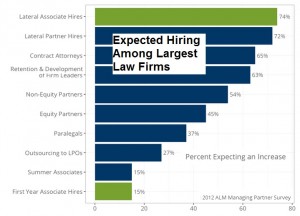 Search firms haven’t yet seen it, but those specializing in attorney placement could be in for a boon in the coming years, as the nation’s largest law firms accelerate their hiring of mid-level attorneys.
Search firms haven’t yet seen it, but those specializing in attorney placement could be in for a boon in the coming years, as the nation’s largest law firms accelerate their hiring of mid-level attorneys.
The traditional model of hiring summer associates who then get hired as entry-level attorneys, eventually working their way up the career ladder before retiring from the firm where they started is essentially dead.
Describing it as “an old model that has gone out the door a long time ago,” James Leipold, executive director of the National Association for Law Placement said Big Law’s recruiting practices have been transformed as firms today place their hiring focus on mid-level lawyers.
Recruiting the best and the brightest during their second year of law school, and then making offers to those who do well over the summer, is today a shadow of what it once was. In the 10 years between 2002 and 2012, the number of summer associates hired by the 250 biggest firms has shrunk by more than 50%.
Now the nation’s firms are hustling after third, fourth and fifth year lawyers with specific skills. The reason is pure and simply, economics. By the time a new lawyer starts work, a firm already has invested almost $250,000 in him or her. That’s counting all the expenses, including the lost billable hours by the partners who once did most of the school recruiting.
Poaching is cheaper, plus the basic training has already been done, as The Wall Street Journal noted almost two years ago. And an attorney with some experience is more desirable to a client than a rank beginner.
Joe Ankus, president of Ankus Consulting, Inc. and executive director of the National Association of Legal Search Consultants, calls lawyers with at least three years of experience the “sweet spot” of a legal recruiter’s business.
They are “a mainstay of my business,” he says of experienced associates, adding that he suspects other legal recruiters who place attorneys would say the same. “That’s where the majority of the hiring is.”
He hasn’t seen much of an increase in searches, probably because law firms are keeping a lid on hiring. However, firms are hiring for certain expertise. Bankruptcy is dead, Ankus says, but real estate “is strong.”
Lateral hiring is a trend unlikely to go away. A 2012 survey by American Lawyer made it plain that lateral moves were on the radar of large law firms. According to the survey, 74% of the managing partners of these firms expect to increase the number of lateral hires of both associates and partners. Only 15% saw a similar increase in hiring entry-level lawyers.
At the same time, the number of associates has been declining, so much so that in 2008 the number of partners employed by the largest firms outnumbered the associates.
What this means is that law firms are facing the same kind of war for talent that many of their clients have experienced for years. And that has lead many firms to beef-up their internal recruiting efforts, in many cases taking management of talent acquisition out of the hands of senior partners and turning it over to experienced, professional recruiters.
The recession, as much as changes in the organizations themselves has driven firms to turn to professionals to take over operations previously assigned to senior partners, says James Leipold, executive director of the National Association for Law Placement.
There’s “a large trend in the last five years to professionalize management,” Leipold explains, and that includes recruiting. “Firms are trying to rely more on their (internal) recruiting.
“They are building a deeper expertise,” he says. As firms do more hiring of experienced attorneys, and especially of partners, Leipold said they will “at least in the short term” find themselves competing for talent.
Even at the senior partner level “there’s a lot more mobility than there has been,” he said.
Sourcing talent with the required skills is not yet so difficult that jobs are going unfilled. But it is growing more difficult.
In its annual salary survey, Robert Half noted:
Despite a deep applicant pool for many legal positions, the market for experienced legal candidates in growing specialty areas is tightening. In fact, more than half (53%) of lawyers surveyed by Robert Half Legal said it is somewhat or very challenging for their law firms or companies to find skilled legal professionals today.
“Multiple employment offers, signing bonuses and counteroffers are more common as organizations compete for top candidates,” the survey report notes.